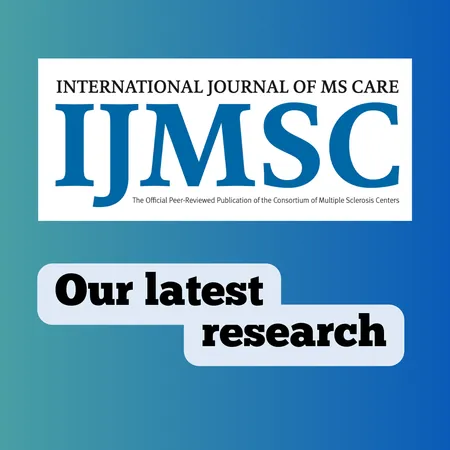
New Insights from September 2024 IJMSC Research on Multiple Sclerosis
2024-11-18
Author: Noah
New Insights from September 2024 IJMSC Research on Multiple Sclerosis
In an exciting development this September, the International Journal of MS Care (IJMSC) has published a series of groundbreaking studies exploring various facets of multiple sclerosis (MS).
Comorbidities and Disability Progression
One notable study conducted in Brazil highlights a troubling trend: individuals with MS often have multiple preexisting conditions, including cardiovascular issues, migraines, psychiatric disorders, autoimmune diseases, and respiratory problems. This multifaceted health landscape significantly increases the risk of disability progression in MS patients. The researchers underline the necessity for early diagnosis and proactive management of these comorbidities, which can potentially enhance patient outcomes. It’s also worth noting that local environmental factors, healthcare access, and demographic differences may contribute to the variations in comorbidity rates and MS progression across different regions.
Barriers to Disease Modifying Therapies
Turning to the medical system, a study from the University of North Carolina Hospitals Neurology Clinic delved into the barriers that affect the timely initiation of Disease Modifying Therapies (DMT) in newly diagnosed MS patients or those changing providers. The investigation found that delays in starting DMT primarily stemmed from requirements for baseline imaging, laboratory tests, and referrals from specialists in complicated cases. While discussions about DMT were common, the approval process for medications averaged an exhaustive nine weeks, revealing significant obstacles such as prior authorization hurdles and financial difficulties faced by patients.
Occupational Interventions
In a promising case report from Iran, researchers explored the benefits of an occupation-based intervention for MS patients. Utilizing tools such as the Canadian Occupational Performance Measure and the 9-Hole Peg Test, they documented positive changes in occupational performance, satisfaction, and hand dexterity among participants. These findings suggest that tailored occupational therapy can substantially enhance quality of life for those battling MS.
Perceived Vulnerability and Assistive Devices
Another significant study from the University of Washington investigated how individuals with MS, particularly those using assistive devices (AD), perceive their vulnerability to interpersonal victimization stemming from their condition. The findings revealed that those with a history of trauma or more severe physical disabilities felt particularly at risk, with the use of ADs heightening this fear. Participants from racial or ethnic minorities reported the highest levels of perceived vulnerability, which correlated with diminished control over their daily activities. While the majority did not perceive themselves as at imminent risk, a concerning subset expressed heightened fears of serious crimes, including assault.
Telecoaching for Rehabilitation
Finally, an exploratory study examined the value of monthly telecoaching for MS patients post-inpatient multidisciplinary rehabilitation (MDR). The results were remarkably positive, showcasing that one-on-one telephone coaching was effective in preserving improvements in health-related quality of life, especially for patients with neuropsychological aims. This approach outperformed web-based coaching, underscoring the significance of personalized support in maintaining the positive outcomes of rehabilitation.
Conclusion
As research continues to evolve, these studies shed light on the complex intersection of MS, comorbidities, healthcare processes, and patient support mechanisms. Whether it’s enhancing treatment initiation processes or providing tailored interventions, the ongoing exploration into these areas holds the potential for significant improvements in the lives of those affected by MS.









 Brasil (PT)
Brasil (PT)
 Canada (EN)
Canada (EN)
 Chile (ES)
Chile (ES)
 España (ES)
España (ES)
 France (FR)
France (FR)
 Hong Kong (EN)
Hong Kong (EN)
 Italia (IT)
Italia (IT)
 日本 (JA)
日本 (JA)
 Magyarország (HU)
Magyarország (HU)
 Norge (NO)
Norge (NO)
 Polska (PL)
Polska (PL)
 Schweiz (DE)
Schweiz (DE)
 Singapore (EN)
Singapore (EN)
 Sverige (SV)
Sverige (SV)
 Suomi (FI)
Suomi (FI)
 Türkiye (TR)
Türkiye (TR)